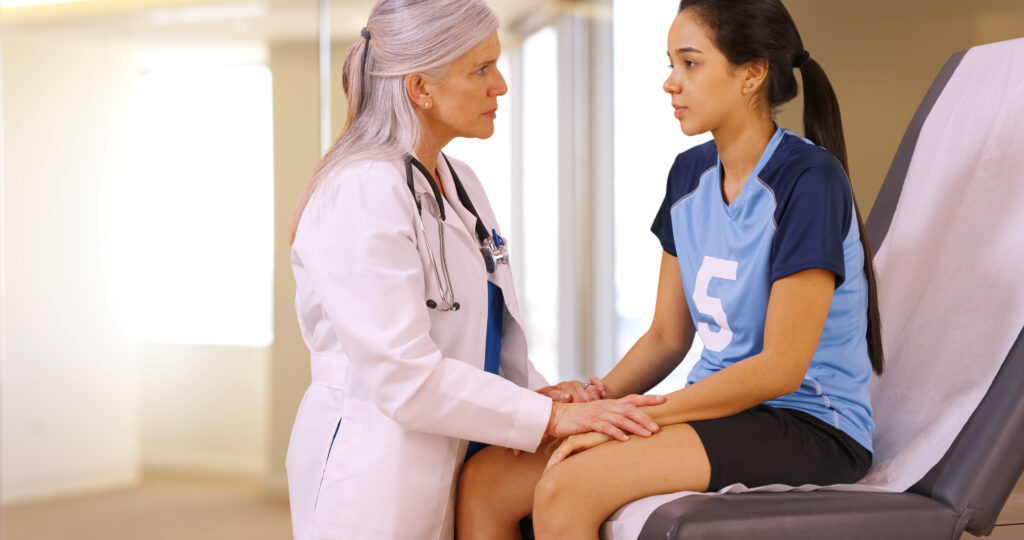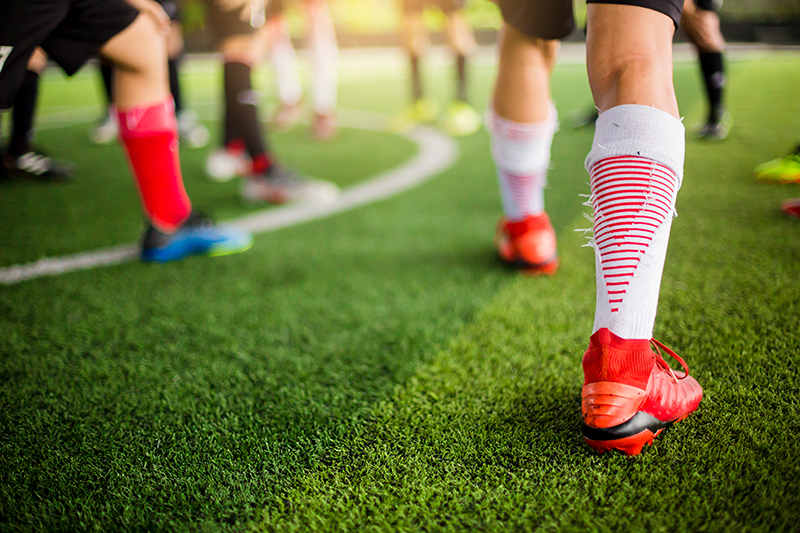If your daughter is involved in intense physical activity, she may be at risk for what is known as the “female athlete triad.”
What Is The Female Athlete Triad?
As the name connotes, the female athlete triad affects female teens and women who play sports or exercise intensely and have a syndrome of three distinct health conditions as a result of their physical activity: energy imbalance (usually from an eating disorder), lack of or disruption of menstruation, and osteoporosis. All three conditions—which make up the female athlete triad—are interrelated.
Eating Disorders
People with the female athlete triad show signs of eating disorders which take the focus of:
- not consuming enough calories
- avoiding certain types of foods
- prolonged fasting
- crash diets
- use (and misuse) of diet pills, diuretics, or laxatives
- more serious eating disorders such as anorexia (starving oneself) or bulimia (binging and vomiting)
Lack of proper nutrition due to these eating disorders can lead to the absence of menstrual periods (amenorrhea).
Lack of periods or amenorrhea
Not eating properly can affect the hormones that regulate the menstrual cycle. The energy demands of playing a sport may put physical and emotional stress on your child which also affects the menstrual cycle. When this happens, your daughter’s menstruation start may be delayed, or she will stop having periods that were once present. This absence of periods is called “amenorrhea.“
Osteoporosis
Loss of bone mineral density, or osteoporosis, is typically associated with older women. However, in the female athlete triad, young athletes also get osteoporosis due to lower estrogen levels and menstrual dysfunction, as well as reduced intake of calcium and Vitamin D (due to the eating disorder) – all of which disrupt the body’s natural bone-building processes.
What Are The Symptoms Of The Female Athlete Triad?
Female athlete triad symptoms include weight loss, preoccupation with food or calorie intake, fatigue, cessation of or increasingly irregular periods, irregular heartbeat, and bone injuries such as stress fractures.
Many parents may notice disordered eating as an initial symptom of the female athlete triad. For example, your teen may focus on her weight, eating too little or exercising too much to remain thin. This preoccupation with body shape and weight and inappropriate nutritional intake can damage her athletic performance due to dehydration, energy loss, and muscle weakness. It could cause long-term health problems if not treated, too, such as kidney damage and other serious conditions.
Another noticeable symptom of the female athlete triad is amenorrhea—lack of menstruation.
Osteoporosis may not be evident until a bone breaks unexpectedly or your daughter complains of aching limbs.
Who Is Most At Risk Of Developing The Female Athlete Triad?
Teenage girls and young women who are most at risk of developing the female athlete triad are those who participate competitively in sports that are technical, aesthetic, endurance, and weight class in nature. These athletes are most likely to engage in excessive dieting which leads to loss of menstruation and the osteoporosis.
There is an emotional component to assessing the risk of developing the female athlete triad as well, including depression, low self-esteem, and suffering from body image issues. Being pressured to always win at any cost (and lose weight or maintain a certain weight to be competitive) takes its toll, as well.
Sports that present the greatest risk of the female athlete triad are:
Dance –with its focus on maintaining a lithe figure and lean aesthetic (especially in ballet), dance also puts female dancers at risk for stress fractures.
Gymnastics
Menstrual irregularity is common in female gymnasts as are hand-wrist, spinal, and lower extremity injuries due to low bone mineral density.
Cheerleading
Competitive cheerleading may prompt your child to lose an unhealthy amount of weight to maintain a certain position on the team—and stay limber and light enough for acrobatics.
Figure Skating
Like dance, figure skating is an aesthetic sport that rewards thin females, and carries a risk of stress fractures.
Long Distance Running
As an endurance sport, distance running demands physical exertion and a great amount of energy (which can be in short supply due to eating disorders), leading to the triad chain reaction of symptoms.
How To Diagnose The Female Athlete Triad
Factors in a female athlete triad diagnosis are a person’s energy availability (which will be low), menstrual dysfunction, and decreased bone mineral density.
Once a parent recognizes the signs or the young athlete brings up the symptoms, it’s time to see a doctor right away to diagnose the female athlete triad (and seek prompt treatment). The physician will take a full medical history, do a complete physical exam, and ask about missed periods, eating habits, and look for signs of stress fractures. The physician may order blood tests to evaluate hormone levels, blood chemistry and rule out other medical conditions and order a bone density scan.
How Is The Female Athlete Triad Treated?
Female athlete triad treatment may require an interdisciplinary team of healthcare providers, as the triad involves physical, behavioral, and emotional components. Once your daughter sees the primary care physician for diagnosis, treatment may include a mental health counselor, nutritionist, gynecologist, orthopedist, and physical therapist to treat any physical injuries.
The goals of female athlete triad treatment are to enhance your child’s bone mineral density to build strong bones, bring back menstruation, and help her eat a nutritionally balanced diet. With successful treatment, your child will have greater energy availability for her sport, regular periods thanks to balanced hormonal levels, and stronger bones that she’ll need for a lifetime.
If your child has stress fractures or other musculoskeletal injuries, the pediatric orthopedist will assess the injury and treat it with wrapping, bracing, or casting.
TPOC’s Center of Excellence for the Female Athlete
TPOC is proud to have a Center of Excellence for the Female Athlete, a team of pediatric orthopedists specializing in pediatric sports medicine. Their focus is on the distinct needs, medical conditions, psychological pressures, and injuries of female athletes.




